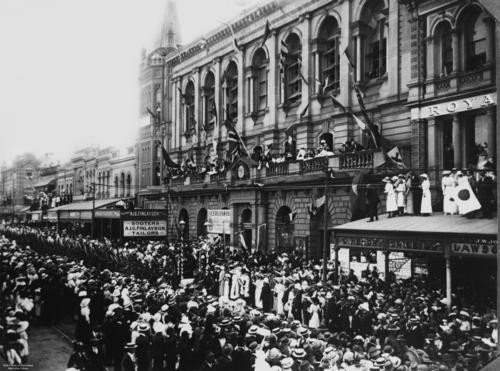
This month one hundred years ago, Queensland's first quota of troops was mobilising, ready for embarkation. On Saturday afternoon 19th September 1914, a force of over 2000 men - Light Horse, with Colonel Stodart commanding the mounted section, Infantry, under Colonel Lee, Artillery, Army Service, and Army Medical Corps, marched through the streets of Brisbane in a 'long, impressive column'. The Brisbane Courier described the men, who had come directly from the training camp at Enoggera, as 'a fine body of sun-tanned, athletic men in khaki'. The Light Horse lead the march, followed by their motor machine guns and the 18 pounder guns of the Field Artillery, then the Service Corps, and the Red Cross wagon. The march followed a considerable route - about 12 1/2 miles from Enoggera via Kelvin Grove Road, Countess Street, George Street, Queen Street, Brunswick Street, and on by Bowen Bridge Road and Newmarket Road back to camp.
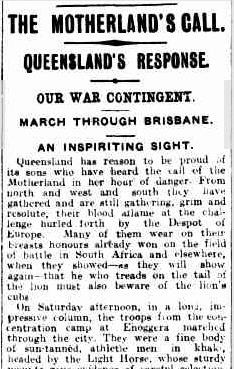
Many thousands of people lines the streets to cheer, and businesses and homes were decorated with bunting. In the spirit of patriotism and pride and admiration, flags of the allied nations floated from buildings and doorposts, and the crowd held aloft thousands of little Union Jacks. Thousands looked down from balconies, windows, and verandas, and over a hundred police officers worked hard to keep the huge crowd back from the middle of the street. At 2.15pm the Lieutenant Governor and Lady Morgan arrived at the saluting base. When the Municipal Band played the National Anthem the crowd raised hats and cheered.
Unfortunately, the jubilant mood soon shifted with the sad news that the submarine AE1 was missing. The Minister for Defence issued the following statement: 'I regret to announce that a report has been received from Admiral Paley, Commander-in-Chief of the Australian navy, that submarine AE1 is missing. She was last seen at 3.30pm on September 14 returning from patrol. There was no enemy in the vicinity where she was last seen and the weather was fine. A thorough search has been made and no wreckage found. It is supposed that the loss is due to an accident. There were 35 officers and men on board at the time'.
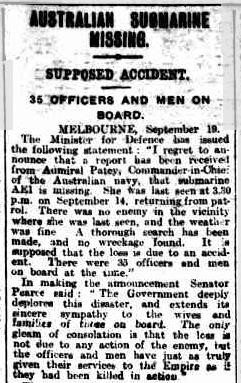
The Prime Minister (Hon. A. Fisher) went on to make the following statement: 'The indications are that they have been lost in the service of their country, owing to the risks and dangers of a sea-faring life. As far as we know they were not in action. If the worst has happened I desire with the people of the Commonwealth, to express sincere sympathy with the relatives and friends of those who have lost their lives in the service of their country. No enemies are known to be in the vicinity. You can add also that I think it advisable to keep the people notified of matters of the kind so that their minds maybe free from apprehension of news of any disasters being withheld.'
Public anxiety was also increased with the report on 24th September that a small British steamer, the Induna, had been captured by the Germans in the Marshall islands. The Induna had been going about her usual rounds, her captain unaware that war had been declared, and was captured by a German warship, one of several vessels lying anchored in Juluit harbour.
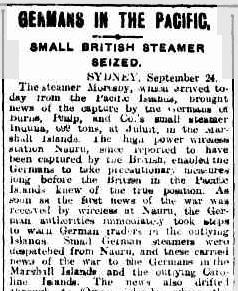
Aside from War news, commentary and debate regarding the election still firmly occupied the public consciousness. This Brisbane Courier article, dated 29th September, bemoaned the lost opportunity for electoral reform, and the dismissive attitude of Mr Fisher and Mr Hughes, as they brushed aside the 5760 duplicated votes of the 1913 election as 'a mere nothing'.
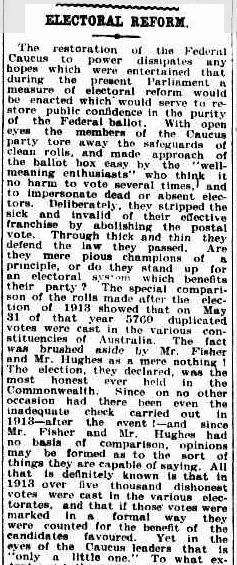
Each week we will be sharing news stories from the week 100 years ago, and we invite you to add your thoughts and comments.
Want to join in and find and correct newspaper articles from 1914 and 1915? Here’s more information about how to get started text correcting newspaper articles on Trove as a Pitch In! digital volunteer.
If you find something you’d like to share we’d love to hear from you at discovery@slq.qld.gov.au
Comments
Your email address will not be published.
We welcome relevant, respectful comments.